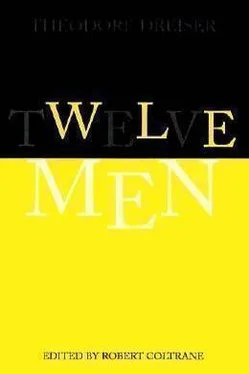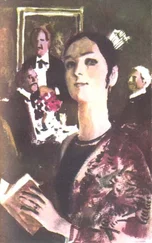Теодор Драйзер - Twelve Men
Здесь есть возможность читать онлайн «Теодор Драйзер - Twelve Men» весь текст электронной книги совершенно бесплатно (целиком полную версию без сокращений). В некоторых случаях можно слушать аудио, скачать через торрент в формате fb2 и присутствует краткое содержание. Год выпуска: 2014, Издательство: epubBooks Classics, Жанр: Биографии и Мемуары, на английском языке. Описание произведения, (предисловие) а так же отзывы посетителей доступны на портале библиотеки ЛибКат.
- Название:Twelve Men
- Автор:
- Издательство:epubBooks Classics
- Жанр:
- Год:2014
- ISBN:нет данных
- Рейтинг книги:4 / 5. Голосов: 1
-
Избранное:Добавить в избранное
- Отзывы:
-
Ваша оценка:
- 80
- 1
- 2
- 3
- 4
- 5
Twelve Men: краткое содержание, описание и аннотация
Предлагаем к чтению аннотацию, описание, краткое содержание или предисловие (зависит от того, что написал сам автор книги «Twelve Men»). Если вы не нашли необходимую информацию о книге — напишите в комментариях, мы постараемся отыскать её.
Twelve Men — читать онлайн бесплатно полную книгу (весь текст) целиком
Ниже представлен текст книги, разбитый по страницам. Система сохранения места последней прочитанной страницы, позволяет с удобством читать онлайн бесплатно книгу «Twelve Men», без необходимости каждый раз заново искать на чём Вы остановились. Поставьте закладку, и сможете в любой момент перейти на страницу, на которой закончили чтение.
Интервал:
Закладка:
In so far as the magazine was concerned, once it began to grow and attract attention he was for me its most important asset; not that he did so much directly as that he provided a definite standard toward which we all had to work. Not incuriously, he was swiftly recognized for what he was by all who came in touch with the magazine. In the first place, interested in his progress, I had seen to it that he was properly introduced wherever that was possible and of benefit to him, and later on, by sheer force of his mental capacity and integrity, his dreams and his critical skill, he managed to center about him an entire band of seeking young writers, artists, poets, playwrights, aspiring musicians; an amusing and as interesting a group as I have ever seen. Their points of rendezvous appeared to be those same shabby quick–lunches in back streets or even on the principal thoroughfares about Times Square, or they met in each other's rooms or my office at night after I had gone, giving me as an excuse that they had work to do. And during all this time the air fairly hummed with rumors of new singers, dancers, plays, stories being begun or under way, articles and essays contemplated; avid, if none too well financed frolics or bohemian midnight suppers here and there. Money was by no means plentiful, and in consequence there was endless borrowing and "paying up" among them. Among the most enthusiastic members of this circle, as I had begun to note, and finally rather nervously, were my art–director, a valiant knight in Bohemia if ever there was one, and she of Bryn Mawr–Wellesley standards. My makeup editor, as well as various contributors who had since become more or less closely identified with the magazine, were also following him up all the time.
If not directly profitable it was enlivening, and I was fairly well convinced by now that from the point of view of being "aware," "in touch with," "in sympathy with" many of the principal tendencies and undercurrents which make for a magazine's success and precedence, this group was as valuable to me as any might well be. It constituted a "kitchen cabinet" of sorts and brought hundreds of interesting ideas to the surface, and from all directions. Now it would be a new and hitherto unheard–of tenor who was to be brought from abroad and introduced with great noise to repute–loving Americans; a new sculptor or painter who had never been heard of in America; a great actor, perhaps, or poet or writer. I listened to any quantity of gossip in regard to new movements that were ready to burst upon the world, in sculpture, painting, the scriptic art. About the whole group there was much that was exceedingly warm, youthful, full of dreams. They were intensely informative and full of hope, and I used to look at them and wonder which one, if any, was destined to have his dreams realized.
Of L― however I never had the least doubt. He began, it is true, to adopt rather more liberal tendencies, to wish always to be part and parcel of this gayety, this rushing here and there; and he drank at times—due principally, as I thought, to my wildling art–director, who had no sense or reserve in matters material or artistic and who was all for a bacchanalian career, cost what it might. On more than one occasion I heard L― declaring roundly, apropos of some group scheme of pilgrimage, "No, no! I will not. I am going home now!" He had a story he wanted to work on, an article to finish. At the same time he would often agree that if by a certain time, when he was through, they were still at a certain place, or a second or third, he would look them up. Never, apparently, did his work suffer in the least.
And it was about this time that I began to gather the true source and import of his literary predisposition. He was literally obsessed, as I now discovered, with Continental and more especially the French conception of art in writing. He had studied the works as well as the temperaments and experiences (more especially the latter, I fear) of such writers as de Maupassant, Flaubert, Baudelaire, Balzac, de Musset, Sand, Daudet, Dumas junior, and Zola, as well as a number of the more recent writers: Hervieu, Bourget, Louys and their contemporaries. Most of all, though, he was impressed, and deeply, by the life and art of de Maupassant, his method of approach, his unbiased outlook on life, his freedom from moral and religious and even sentimental predisposition. In the beginning of his literary career I really believe he slaved to imitate him exactly, although he could not very well escape the American temperament and rearing by which he was hopelessly conditioned. A certain Western critic and editor, to whom he had first addressed his hopes and scribblings before coming to me, writing me after L―'s death in reference to a period antedating that in which I had known him, observed, "He was crazy about the fin de siècle stuff that then held the boards and from which (I hope the recording angel will put it to my credit) I steered him clear." I think so; but he was still very much interested in it. He admired Aubrey Beardsley, the poster artists of France, Verlaine, Baudelaire, Rops, the Yellow Book, even Oscar Wilde, although his was a far more substantial and plebeian and even radical point of view.
Unfortunately for L―, I have always thought, there now thrust himself forward the publisher and owner of the magazine, who from previously having been content to see that the mercantile affairs of the magazine were in good order, had decided that since it was attracting attention he should be allowed to share in its literary and artistic prestige, should indeed be closely identified with it and recognized as its true source and inspiration—a thing which in no fashion had been contemplated by me when I went there. From having agreed very distinctly with me that no such interference would at any time be indulged in, he now came forward with a plan for an advisory council which was to consist of himself and the very members of the staff which I had created.
I could not object and it did not disturb me so much personally. For some time I had been sensing that the thing was for me no end in itself, but an incident. This same I felt to be true for L―, who had been taking more and more interest in the magazine's technical composition. At the same time I saw no immediate way of arranging my affairs and departing, which left me, for a very little while, more or less of a spectator. During this time I had the dissatisfaction of noting the growth of an influence with L― which could, as I saw, prove only harmful. M― was no suitable guide for him. He was a brilliant but superficial and very material type who was convinced that in the having and holding of many things material—houses, lands, corporation stocks, a place in the clubs and circles of those who were materially prosperous—was really to achieve all that was significant in the now or the hereafter. Knowing comparatively nothing of either art or letters, or that subtle thing which makes for personality and atmosphere in a magazine or in writing (and especially the latter), that grateful something which attracts and detains one, he was nevertheless convinced that he did. And what was more, he was determined not only to make friends with and hold all those whom I might have attracted, providing they could prove useful to him, but also a number of a much more successful group in these fields, those who had already achieved repute in a more commonplace and popular way and were therefore presumably possessed of a following and with the power to exact a high return for their product, and for the magazine, regardless of intrinsic merit. His constant talk was of money, its power to attract and buy, the significance of all things material. He now wanted the magazine to be representative of this glowing element, and at the same time, paradoxical as it might seem, the best that might be in literary and artistic thought.
Читать дальшеИнтервал:
Закладка:
Похожие книги на «Twelve Men»
Представляем Вашему вниманию похожие книги на «Twelve Men» списком для выбора. Мы отобрали схожую по названию и смыслу литературу в надежде предоставить читателям больше вариантов отыскать новые, интересные, ещё непрочитанные произведения.
Обсуждение, отзывы о книге «Twelve Men» и просто собственные мнения читателей. Оставьте ваши комментарии, напишите, что Вы думаете о произведении, его смысле или главных героях. Укажите что конкретно понравилось, а что нет, и почему Вы так считаете.









